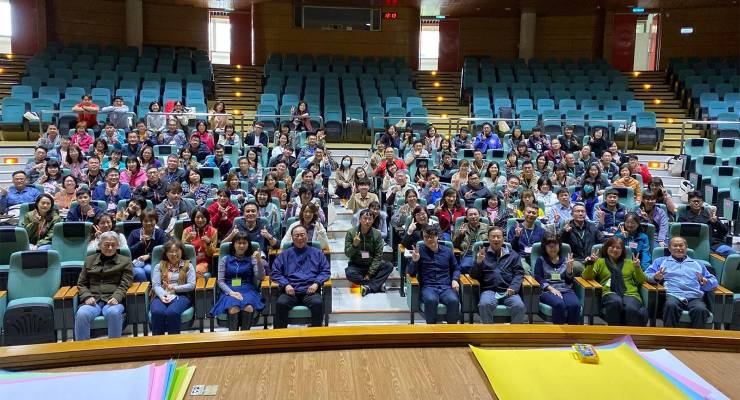
Australia and France have had their public points of difference, but Chinese ambassadors to both countries were in lockstep this week with claims that Taiwanese people would need “re-education” on matters of the motherland when — not if — the island is “reunited”.
“Once Taiwan is reunited … there might be a process for the people in Taiwan to have a correct understanding of China, about the motherland,” said Chinese Ambassador to Australia Xiao Qian during a National Press Club address on Wednesday.
He echoed the sentiments of his French counterpart Lu Shaye, who last week told BFM TV that China “will re-educate”.
“I’m sure that the Taiwanese population will again become favourable of the reunification and will become patriots again,” he said, adding in a later interview that re-education was a necessary antidote to Taiwan’s “education of desinicisation on its population”.
Although ominous, triggering, and not uncharted territory for China, is a Chinese Communist Party (CCP) edition of the curriculum likely to take in Taiwan? From the outside, Taiwan is perceived as a political supercharger, but on the island, there is a preference for the apolitical, particularly when it comes to the school curriculum.
“Everyone in Taiwan has a little ‘secret police’ living inside them,” Lo Pei-yun, a junior high school health education teacher and librarian in Taoyuan told Crikey. “A Taiwan Garrison Command to enforce authoritarianism rule. We are naturally careful people and tend to self-censor a little.”
Taiwanese teachers’ attitudes towards politics vary, but like Lo, many endeavour to keep these conversations out of the classroom. “Sometimes students will write about their views, sometimes they’ll write about their parent’s views, and sometimes they discuss these ideas in the classrooms. The teachers need to be careful when engaging in these discussions,” she said.
“In Taiwan, politics is a little bit like religion. If you have a slight disagreement with one party, you are viewed as the dogs of the other party. We can’t really talk with students about unification or independence because they’re ideas that are too clear-cut.”
Elementary and middle school teachers in Taiwan are public servants and therefore expected to uphold standards of administrative neutrality. In practice, this means they can’t advocate for a particular political candidate, but Lo explains that teachers tend to overcompensate and avoid conversations altogether: “Even if students approach them, some will say, ‘Go away, I didn’t hear you, go away.’”
Chihhao Yu, co-director at IORG, a Taiwanese non-government organisation that does research and training on information literacy, said teachers don’t like to deal in politics. His organisation initially approached schools with a teaching focus on Chinese online influence operations, but Yu quickly learned it wouldn’t work.
“Some teachers would dismiss us as an arm of the DDP (Democratic Progressive Party), trying to push green thoughts,” he said. “You need to find common ground if you want to make your politics better.”
Media literacy was added as a key component to the Taiwan school curriculum in 2017. But Yu maintains that until teachers are themselves taught how to teach critical thinking, things are unlikely to change.
“We need to do a lot more to boost people’s media literacy. I’m 36 and I grew up without that education. My parents, uncles, aunties, grandparents, they all grew up without that,” he said. “Students are often more information literate than their teachers.”
Teaching remains exam-focused and textbook-heavy, and Lo argues this model leaves little space for critical thinking and discussion. “These exams lead people towards a correct answer and that is dangerous for us. The textbook tells you all you need to know, so what is left to discuss?” she said resignedly.
Although Taiwan’s current education system might make it easier for the CCP to transplant its China-friendly curriculum, that does not mean it would easily take.
Yu was clear: “There would be a lot of pushback to any kind of re-education effort here, with or without reunification”. He puts that down to Taiwanese identity.
It has long been an official CCP line that the 1.4 billion Chinese people including the people of Taiwan “are all Chinese”, but Yu says ambassadors and the like are “speaking from an imagined world”.
“We have to look at how the general public thinks via credible polls, not internet polls that the [People’s Republic of China] keep quoting,” he said.
National Chengchi University has tracked the identity of Taiwanese citizens between 1992 and 2022. In 1992, only 17% of all Taiwanese identified as such. Twenty-five per cent said they were Chinese, and 46% called themselves both Chinese and Taiwanese. Thirty years later, almost 65% of the population now identify as exclusively Taiwanese. Thirty per cent still see themselves as both, and less than 2.5% call themselves Chinese.
Both Yu and Lo agreed that it was not their role to push an agenda or further a cause, but rather to give people the skills to filter fact from fiction and make better judgments, irrespective of whether they identify as Taiwanese, Chinese, or a subset of both.
“If we believe that we want to keep living in democratic Taiwan, we must find ways to reinforce critical thinking and advance information literacy,” Lo said.








Presume the PRC diplomats are ‘wolf warriors’ reading from the same script for social media etc., but can be a little over the top; much like their counterparts in Anglo media and fringes….
Meanwhile, on ‘critical thinking’ and related literacies, locally, where is the evidence of these essential soft skills in Australian secondary schools and some technical, science or vocational course areas in universities?
The ideological dispute is over ‘democracy’ versus ‘autocracy’, or ‘freedom values’ versus ‘common prosperity’.
The Taiwanese lost the ideological dispute in 1949, they shouldn’t expect others to go to war, to save them by involving the whole world in a war they lost.
We have enough of our own problems:
Thursday, August 11, 2022 – Bill Mitchell – Modern Monetary Theory (economicoutlook.net)
“Radical change is needed and mainstream economics will not be part of the solution.”
Last night on Q&A someone asked if capitalism is destroying democracy; the correct answer is not capitalism per se, but the failure of democratic governments to properly fund teachers, age-care workers, public hospitals etc and social housing.
All of which is causing increasing disillusionment with democracy.
Meanwhile the conservative neoliberal ideologue(s) on the panel were more interested in discussing why it is necessary to go to war with China……
So has China already invaded Taiwan?
With such rigorous self-censorship Taiwan sounds like a great place for Baker’s Delight to hang their ‘No Sexual Harassment’ signs. (See Rundle article).
Small point – the Chinese ambassador did not use the term “re-educate”. He was asked whether China would re-educate the Taiwanese people. Journalists then educated their readers to understand that “re-education” is a euphemism for mistreatment of minorities, and here we are –
Chinese ambassadors eager to ‘re-educate’ Taiwan
So what is “a process to have a correct understanding of China”? How will it happen?
I’m sure it’ll be a great leap forward.
Rats in Room 101?
Most likely through the school system.
Re-education is a euphemism for brainwashing and thought control and propaganda. Nothing to do with minorities. It’s for everyone l.
Re-education can mean a number of things including simply learning more about a subject to eliminate preconceptions.